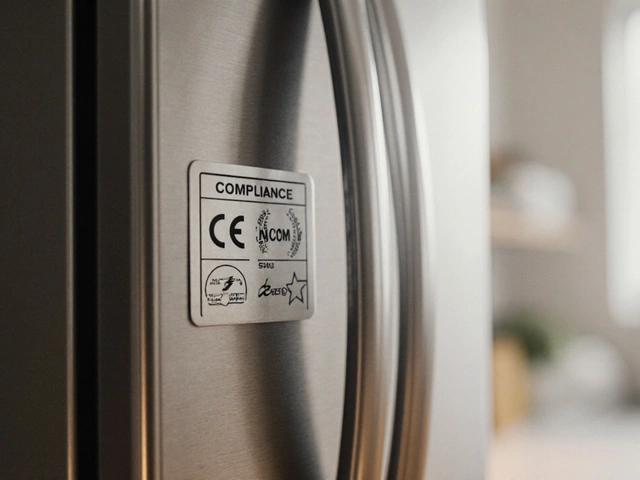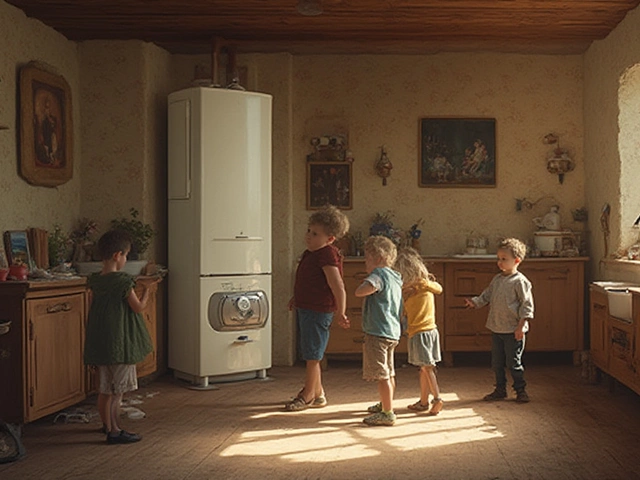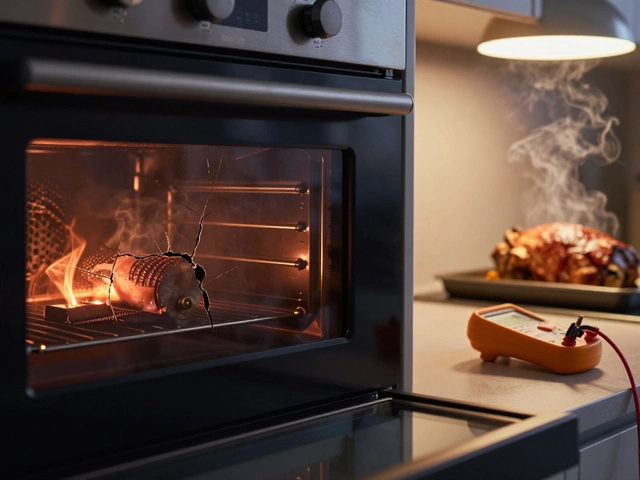So, you're probably wondering how long your electric oven is supposed to hang around before it decides to kick the bucket, right? Well, these kitchen beasts are built to last around 13 to 15 years if you treat them right. But it's not just about the years; it's about how you use it. An oven that's babied with regular cleaning and careful handling might stick around even longer.
Now, it's interesting to note that not all ovens are created equal. The brand and model you picked can make a difference. Some high-end models come packed with features that could potentially add to their longevity. But sometimes, a simple and sturdy oven without all the fancy extras can outlast more complex models due to fewer parts that can fail.
- Understanding the Average Lifespan
- Factors Affecting Oven Longevity
- Tips for Extending Your Oven's Lifespan
- Signs It's Time to Repair or Replace
- Choosing a Durable Oven for Your Home
Understanding the Average Lifespan
So, your electric oven is a trusty kitchen sidekick, but how long can you expect it to stay in the game? Most electric ovens typically hang in there for about 13 to 15 years, give or take. This might seem like a wide range, but there's a reason for that. Factors like usage, brand, and maintenance habits all come into play in a big way.
The first thing to keep in mind is the kind of usage your oven gets. If you're a passionate home cook who fires up the oven daily for baking, roasting, and the occasional pizza night, your oven might wear out a bit faster than if it's only used for Sunday dinners. Think of it like a car—the more you drive, the more wear and tear it experiences.
Now, let's talk brand and build quality. Not all ovens are equal—some brands are known for crafting durable appliances that can outlast the competition. Brands like Whirlpool, General Electric, and Bosch have a good reputation for longevity. Checking warranties can also offer insight into how long manufacturers expect their ovens to last.
To get a sense of durability in action, a survey of households revealed that most families reported using their oven for an average of five sessions per week over its lifespan. And here's a fun bit—ovens in households with kids tend to last a little shorter due to increased usage for snack baking.
| Annual Usage Frequency | Expected Lifespan (Years) |
|---|---|
| Light (1-2 times a week) | 15-20 |
| Moderate (3-4 times a week) | 13-15 |
| Heavy (Daily use) | 10-12 |
Factors Affecting Oven Longevity
Okay, let's get into what really makes or breaks the life of your electric oven. It isn't just a matter of time; there's more cooking up behind the scenes.
Maintenance is your oven's best friend. Regular cleaning keeps all those parts working smoothly. Grease and crumbs don't just look bad—they can mess things up over time. Plus, inspecting for any early signs of wear can save you from bigger problems.
How you use your oven is another biggie. If you're the type who preheats for hours or slams the door shut, that's going to affect how long it sticks around. Gentle use goes a long way in preventing repairs and keeping it running like a champ.
Diving into the quality, the brand of your oven can make a big difference too. Some brands are, let's say, more 'premium,' known for their durability. An easy way to get insights is to check user reviews and reliability ratings.
Then there's the installation. If it wasn't set up right from the get-go, various issues could creep up. Always make sure it's properly leveled and has the right space around it for ventilation. Poor installation could lead to overheating or malfunctioning parts.
| Factor | Impact |
|---|---|
| Maintenance Frequency | Regular cleaning +2 years |
| Usage Habits | Gentle use +1-3 years |
| Brand Quality | High-quality brand +3 years |
| Installation Quality | Proper installation +1 year |
Stick to these tips, and you'll not only extend your oven's life but also save your wallet from unnecessary repairs. Sounds like a pretty sweet deal, right?

Tips for Extending Your Oven's Lifespan
Keeping your electric oven in tip-top shape isn't rocket science, but it's not a set-it-and-forget-it deal either. Regular maintenance goes a long way in stretching those 15 years to maybe even longer with good care. Here’s what you can do:
- Regular Cleaning: Make it a habit. Residue from spills and splatters can bake onto the surface over time, affecting efficiency and even causing funky odors. A little soap and a non-abrasive cloth are your best friends here.
- Check the Seals: Those rubber gaskets on the door keep the heat where it belongs. If they're worn out, your oven's going to work overtime, which isn't great for its lifespan or your electric bill. Give them a once-over now and then for cracks or wear.
- Mind the Elements: The heating elements are the lifeblood of your oven. Keeping them clean prevents uneven heating—just make sure the oven's off and cool before you start poking around with your cleaning tool of choice.
- Use It Wisely: Don’t slam the door or overload the oven. gentle handling keeps parts from getting out of whack or breaking, which means fewer repair calls.
- Be Smart About Repairs: Fix small issues before they snowball into big problems. A fan that makes a new noise or a light that won't turn off are little cries for help. It's smart to check things out and catch the problem early.
Sometimes it's the simple stuff that makes the biggest difference. These easy moves can ensure your oven has a healthy, long life, making your eating and baking experiences that much better!
Signs It's Time to Repair or Replace
When your electric oven starts causing you headaches instead of baking your pizza evenly, it might be trying to tell you something. Here are some clear signs that it's time to either repair that trusty oven or start looking for a new one:
- Uneven Cooking: If you find that your brownies are burnt on one side and undercooked on the other, your oven might have a heating element problem that needs fixing.
- Strange Noises: An electric oven making loud buzzing or clunking sounds isn't normal. These noises could point to electrical problems or broken components.
- Slow to Heat: When preheat times seem to stretch longer and longer, your oven could have a faulty thermostat or worn-out heating element.
- Rising Energy Bills: A noticeable jump in your electricity bill without an uptick in baking might suggest your oven's efficiency is slipping due to age or malfunction.
- Frequent Repairs: If you're calling the repair guy more often than you'd like, it might actually be cheaper in the long run to replace the oven entirely.
Here’s a quick guide: If the repair costs are more than half the price of a new oven, or if your oven is over 15 years old, replacement is usually more economical. But sometimes a simple fix can add a few bonus years to your appliance's life, so consider getting an expert opinion before making the final call.
| Age of Oven | Action |
|---|---|
| Less than 10 years | Repair |
| Over 10 years | Repair if affordable |
| More than 15 years | Consider Replacement |
Being in tune with your oven's performance helps maximize its lifespan and efficiency. Don't wait until you're stuck with a full roast dinner and no cooking power!

Choosing a Durable Oven for Your Home
Picking the right electric oven is kind of a big deal, especially if you want it to last. First off, think about the brand. Brands like GE, Whirlpool, and Bosch have a solid rep for making durable ovens. They might be a bit pricier, but the quality often means you'll spend less on repairs down the line.
Look at the materials used. More stainless steel generally means less chance of rust and wear over time. It's not just about looking slick, it's about longevity. Check the features too. While it's great to have all those bells and whistles – like self-cleaning modes and convection settings – more features mean more things that can break. Weigh the extras against how much you'll actually use them.
Energy efficiency counts too. Modern ovens come with energy ratings, and picking one with a high rating can save on electricity bills. This also usually means the oven is built with more advanced, durable tech. Plus, many states offer rebates for choosing energy-efficient appliances, so that's something to consider.
Lastly, don't ignore reviews and ratings. Real-life user experiences can tell you how an oven holds up over time and if there are common issues. Look for reviews that mention the lifespan of the oven as well as customer service experiences in case repairs are needed.
- Research top-rated brands known for durability
- Prioritize stainless steel components
- Balance features you need versus reliability
- Consider energy-efficient options
- Check customer reviews for insights on longevity
By paying attention to these details, you'll have a better chance of getting an oven that will stick around while making your kitchen life easier.





